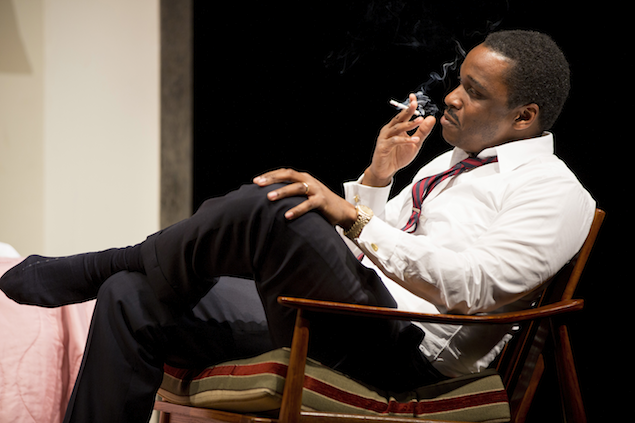
Up until about midway through
The Mountaintop,
Katori Hall’s Olivier Award-winning play currently having its Washington premiere at Arena Stage,
the show is a provocative, reasonably absorbing look at Dr. Martin Luther King Jr.’s
last night on earth. King (Bowman Wright) is a bundle of nerves and anxious energy—he chain smokes, checks his room for bugs,
removes his shoes (grimacing at the smell), and converses in a meaningfully loaded
and flirtatious way with the maid, Camae (Joaquina Kalukango), who brings him a coffee. The tension that seeps into the air from the play’s setting
(the Lorraine Motel, Memphis) and the date (April 3, 1968) is enough to occupy the
audience for 40 minutes or so while we wait for something to happen.
Then something does happen, and tonally it’s a shift so abrupt and jarring it’s as
if a Busby Berkeley chorus had tap-danced its way into an Ibsen play. To say anything
else would ruin the show altogether, so let’s leave it at this: Camae isn’t who she
seems to be. If you’re the kind of person who welcomes theatrical bipolarity (and
maybe even if you’re not), then the subsequent action might be compelling, heartbreaking,
and zanily inventive; if you’d been enjoying the funny back-and-forth between the
gloomy but priapic King and his loose-lipped chambermaid, it might all feel like too
much of a leap to remain invested.
Directed by
Robert O’Hara, a playwright himself who won a Helen Hayes Award for
Antebellum when it premiered at Woolly Mammoth in 2009,
The Mountaintop takes a fascinating premise—the reality of a very mortal American hero who seems
to sense his days are numbered—and suffuses it with a wry sense of self-awareness,
as if both characters are aware all along that they’re playing parts. There’s even
a scene where Camae puts on King’s jacket and shoes and acts out her own impression
of the Reverend Doctor, a not-so-subtle allusion to the playmaking going on.
Hall’s characters have funny lines, and the actors share an enjoyable chemistry. Camae
is foul-mouthed, whip-smart, and easily provoked, and Kalukango plays her with a youthful
charm, as if life hasn’t yet crushed her in the way it seems to have beaten down King.
Coughing nonstop and prone to black moods and panic attacks, Wright’s King flirts
with intensity and an air of desperation. The characters’ physical interaction is
minimal—he grasps her hand while she lights his cigarette, she flashes some skin while
digging cigarettes out of her bra and a flask from her stocking—but their minds frequently
connect in a way that’s intriguing to watch.
Set and costume designer
Clint Ramos stages the action in a motel room bisected (so the wood laminate is still showing)
and placed on a turntable, so the audience sees the balcony first—King appears while
the audience is being seated and frowns while muttering lines from his speech—and
then the room’s interior, done in ’60s decor with twin beds with pink coverlets and
heavy beige drapes. Heavy rain projected onto the back of the stage is remarkably
effective, as are some other elements by
Jeff Sugg.
Hall’s take on MLK is nuanced and sympathetic in a warts-and-all way. This is King
as a real man, flawed in his passions and private moments but fiercely committed to
changing minds through civil protest, and aware of the toll it takes on him. “Fear
has become my companion,” he tells Camae at one point. “She is my lover. I know the
touch of fear even more than I know my own wife.” For a man whose reputation lingers
as a saintly public figure with very human private failings, it’s an oddly seductive
way of describing his relationship with his own impending death. Wright delivers his
strongest performance toward the end of the play, when King’s desperation reaches
the surface, and his sense of grief is powerfully rendered. More of this emotional
poignancy and less gimmickry might make this mountain a more majestic climb.
The Mountaintop
is at Arena Stage through May 12. Running time is about an hour and 40 minutes, with
no intermission. Tickets ($40 and up) are available via Arena’s website.

















